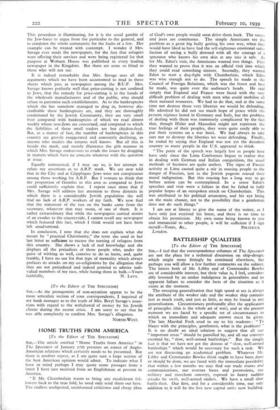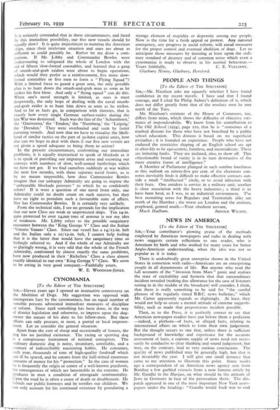BATTLESHIP QUALITIES
[To the Editor of THE SPECTATOR] feel that the correspondence columns of The Spectator are not the place for a technical discussion on ship-design, which might more fittingly be continued elsewhere, but perhaps you will allow a few further comments on the subject. The letters both of Mr. Libby and of Commander Bowles are of considerable interest; but their value is, I feel, consider- ably lessened by an undue indulgence in generalities and an apparent failure to consider the facts of the situation as it exists at the moment.
The sweeping generalisation that high speed at sea is always the attribute of the weaker side and the weaker ship contains just as much truth, and just as little, as may be found in any generalisation. Circumstances profoundly alter the application of principles (this is the whole art of war), and at the present moment we are faced by a specific set of circumstances to which an immediate and adequate answer must be given. The late Marshal Foch used to say to his students : "To blazes with the principles, gentlemen, what is the problem? It is no doubt an ideal solution to suggest that all our "important areas" should be patrolled by, and all our convoys escorted by, "slow, well-armed battleships." But the simple fact is that we have not got the dozens of "slow, well-armed battleships" which would be necessary for such a task. We are not discussing an academical problem. Whatever Mr. Libby and Commander Bowles think ought to have been done or should be done, we are faced with the immediate possibility that within a few months we may find our trade routes and communications, our oversea bases and possessions, our military and merchant convoys, exposed to heavy sudden attacks by swift, well-armed raiders. We have a small slow battle-fleet. Our first, and for a considerable time, our only addition to. it will be the five new capital units now building.
Is it seriously contended that in these circumstances, and faced by this immediate possibility, our five new vessels should be equally slow? It is quite impertinent to mention the American ships, since their irrelevant situation and ours are about as different as could possibly be. Rather let me draw a com- parison. If Mr. Libby and Commander Bowles were endeavouring to safeguard the whole of London with the aid of fifteen 'slow-footed constables, and learned that a gang of smash-and-grab raiders were about to begin operations, which would they prefer as a reinforcement, five more slow- footed constables or five men to form a "Flying Squad "? With a limited force to guard a great area, the only possible plan is to hunt down the smash-and-grab man as soon as he strikes his first blow. And only a "flying squad" can do this. When one's naval strength is limited, as ours is most desperately, the only hope of dealing with the naval smash- and-grab raider is to hunt him down as soon as he strikes. And so far as facts go, in comparison with theories, that is exactly how every single German surface-raider during the late War was destroyed. Such was the fate of the' Schamhorst,' the Gneisenau,' the 'Emden,' the 'Nurnberg,' the 'Leipzig,' the 'Dresden.' They were overhauled and sunk by faster pursuing vessels. And now that we have to visualise the likeli- hood of similar tactics on the part of 30-knot capital units, how else can we hope to deal with them if our five new vessels are not given a speed adequate to bring them to action?
In the present circumstances, confronting our immediate problems, it is equally impractical to speak of blockade as it is to speak of patrolling our important areas and escorting our convoys with numbers of slow, well-armed battleships which we have not got. If we find ourselves suddenly at war within the next few months, with three separate naval fronts, as is by no means impossible, how does Commander Bowles imagine that our unhappy Admiralty are going to impose the "unbearable blockade pressure" to which he so confidently refers? If it were a question of one naval front only, our Admiralty could no doubt count on such success, but they have no right to postulate such a favourable state of affairs. Nor has Commander Bowles. It is certainly very unlikely.
From the technical side, I see no grounds for the implication that our new Class are weak or unprotected ships. Ten 54-in. guns protected by over 14,000 tons of armour is not my idea of weakness. Mr. Libby refers to the possible sanguinary encounter between the 'King George V' Class and the Italian 'Vittorio Veneto' Class. Since our vessel has.a 14/15-in, belt and the Italian only a to/t2-in. belt, I cannot help feeling that it is the latter that would have the sanguinary time so feelingly referred to. And if the whole of our Admiralty are so glaringly wrong, it is very odd that the whole of the French Admiralty, confronted by almost exactly the same problems, have now produced in their ' Richelieu ' Class a class almost exactly identical to our own 'King George V' Class. We seem to be erring in very good company.—Faithfully yours, W. E. WOOSNAM-JONES.















































 Previous page
Previous page